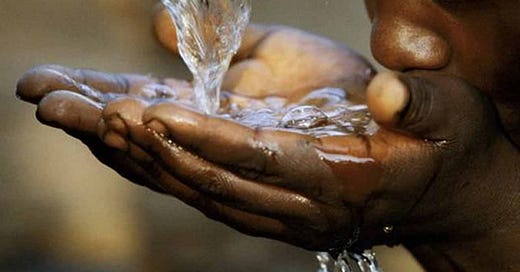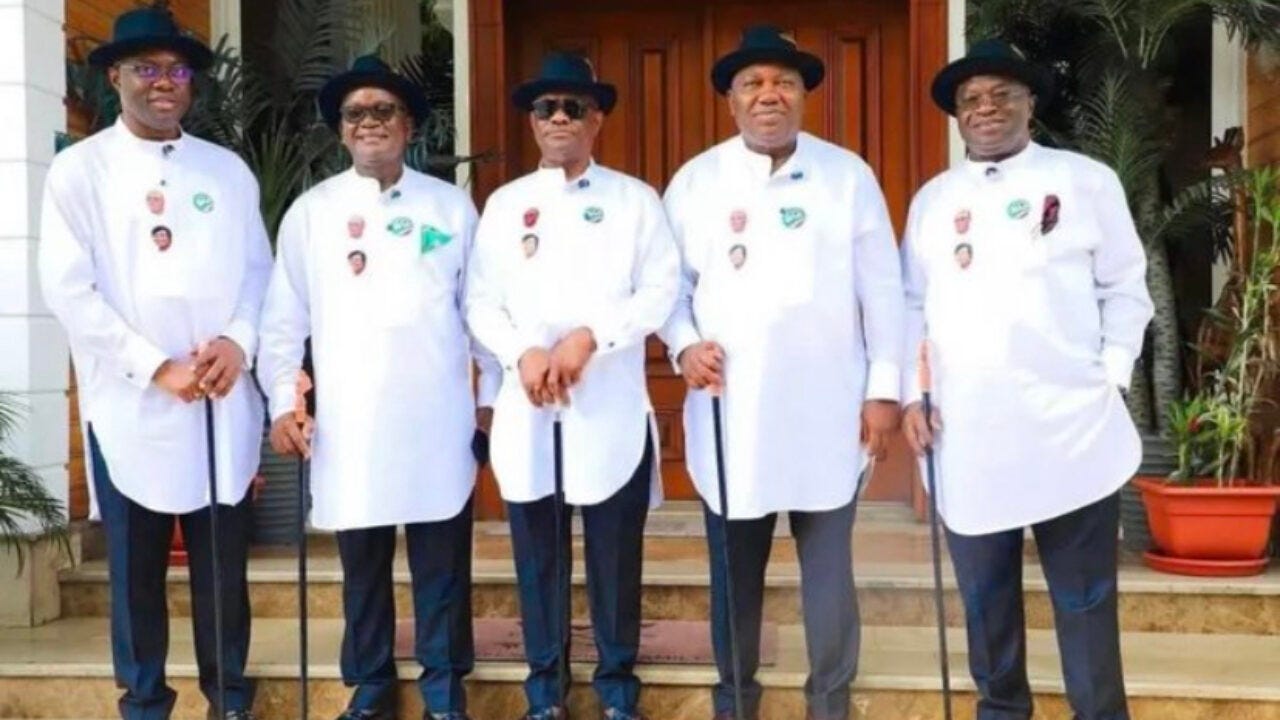Good morning.
We are taking a look at a controversial water bill being considered by the National Assembly for the umpteenth time, the choices before the PDP G5 and a deadly crush in Calabar.
If you find this newsletter useful, please support my work by sharing it with others.
For Wike’s G5, silence is the best answer
Five Governors from the opposition PDP, who have withdrawn their support for their party’s presidential flagbearer Atiku Abubakar, have been left in a conundrum on who to support in 2023.
The governors, led by Nyesom Wike of Rivers state, had demanded the resignation of the PDP’s national chairman, Iyorchia Ayu, before they could support Atiku.
With Ayu remaining as chairman, the governors are now said to be considering a public endorsement of either Peter Obi of the Labour party or Bola Ahmed Tinubu of the ruling APC.
According to sources who spoke to Punch Newspaper, the governors may adopt Obi, who apparently has the backing of former president Olusegun Obasanjo.
However, some of the governors believe Tinubu has a better chance at victory.
Sources say the G5 governors will announce their decision on January 5, barring any unforeseen circumstances.
My take: Like I’ve written previously in this newsletter, the governors have little to gain by announcing their support for a presidential candidate outside of the PDP. They have no intention of leaving the party and at least three of the G5 governors are contesting elections under the PDP after the presidential election — a PDP loss at the centre does not help their chances. I expect them to stall this purported announcement and continue to make threats on how Atiku can never win without their support.
A controversial water bill
The federal government is said to be pushing for a speedy passage of the National Water Resources Bill, 2022, at the national assembly today.
According to one report, the water bill would grant regulation of waterbodies to the federal government who, under president Muhammadu Buhari, will then allocate such waterbodies to herdsmen to “the detriment of legitimate landowners and aboriginal communities.”
Under the bill, activities such as fishing, sand dredging, land reclamation and borehole drilling will require a license to perform; the federal government can also seize control of natural water bodies and introduce taxes for their use.
The implication is that millions of Nigerians whose livelihoods depend on water may now be forced to pay for its use.
Suleiman Adamu: The minister of water resources has accused critics of the bill of politicising a development matter. “To the last day that I am minister in this ministry, I will continue to pursue this bill to its logical conclusion,” he said.
My take: The Senate rejected a version of this bill in 2018. And I believe this is the third time the bill is making the rounds at the National Assembly. Maybe I’m wrong, but I don’t see how handing over the nation’s water resources to the federal government will lead to universal water access. Nigerians should resist a speedy passage of this bill.
David Hundeyin: The award-winning journalist analysed the bill in 2020. “It contains unconstitutional clauses explicitly written to shield its executors from facing liability over the mayhem it will almost certainly unleash if it passes into law,” he said.
Tragedy at bikers’ parade in Calabar
At least seven persons died and 29 were injured after a Toyota Camry car rammed into a crowd at a bikers’ parade ahead of the Calabar carnival in Cross River.
According to the Federal Road Safety Corps, the car had lost control but the driver is said to be on the run.
The accident brought activities at the parade to an end for the day.
Cross River state governor, Ben Ayade, has ordered an investigation into how the motorist evaded security barricades.
The Calabar carnival had been on break for over two years due to the Covid pandemic.
What else is happening?
Akin Osuntokun: The former managing director of the News Agency of Nigeria has been selected to replace Doyin Okupe as the director-general of the Labour party’s presidential campaign council.
Chris Ngige: The minister of labour and employment said the federal government is working on a salary increase for civil servants to reflect current economic realities.
Slum party: A dance carnival in this Lagos slum is aiming to help reduce tensions between rival gangs.
Call for diversification: The central bank believes the concentration of fintech companies in Lagos is slowing down the country’s overall fintech growth.
Insecurity: Bandits have killed no fewer than four farmers and abducted over 100 others over unpaid taxies in communities across Niger state.
Bloated: The Senate has proposed the establishment of 376 new agencies and institutions despite recommended cuts by the federal government.
Profile: Chinelo Okparanta is on the cover of the December issue of Open Country Mag.
And that’s it for today. Let’s do this again tomorrow.






